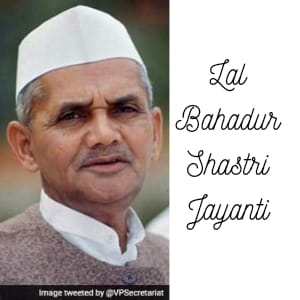Lal Bahadur Shastri 119th Birth Anniversary: Remembering Shastriji’s Ideologies , Influences And Impact
Lal Bahadur Shastri’s influential ideologies and the impact of Gandhian philosophy on his leadership, highlight his important role in Indian history and his enduring legacy.
Lal Bahadur Shastri, the second Prime Minister of India, was born on October 2, 1904. He was known for his simplicity, honesty and commitment to social justice. While there is no complete list of his favorite books or ideologies, we can discuss some of the principles and ideologies he adhered to and loved.
Lal Bahadur Shastri Birth Anniversary: Ideology Lal Bahadur Shastri, India’s revered leader, had deep roots in Gandhian philosophy, socialism and a vision of national unity.
Learn how these ideologies shaped his tenure and left a lasting impact on India’s socio-political landscape.
1. Gandhian philosophy Shastri was deeply influenced by Mahatma Gandhi’s principles of non-violence, truth and civil disobedience. He was actively involved in the Indian independence movement and was inspired by Gandhi’s approach to political and social change.
2. Socialism and social justice Shastri believes in socialism and wants to bridge the gap between the privileged and the less fortunate. He worked to implement policies aimed at improving the living conditions of the poor and combating social inequality.
3. Self-sufficiency and agricultural growth Shastri emphasized self-sufficiency in food production and called on the country to increase agricultural productivity. The slogan “Jai Jawan Jai Kisan” (Hail Soldier, Hail Farmer) highlights the importance of the armed forces and the agricultural sector in the country’s progress.
4. National unity and integrity Shastri was an advocate of national unity and integrity. During his tenure as Prime Minister, he led the country during the 1965 Indo-Pak War and encouraged unity and resilience among the people. Lal Bahadur Shastri Jayanti: 3 favorite books Although specific information about Shastri’s favorite books is not widely recorded, it is known that he had a penchant for reading and self-study. He was an educated man and had a deep interest in many different subjects, including philosophy, politics and literature.
Some books that may have influenced him include
1. Mahatma Gandhi’s Story of My Experiments with Truth: Gandhi’s autobiography, in which he shared his principles and experiences, may have had a significant influence on Shastri.
2. Hind Swaraj by Mahatma Gandhi: This book reflects Gandhi’s vision for India and his critique of modern civilization, which may have shaped Shastri’s views on self-government and Indian society.
3. M. K. Gandhi’s My Experiments with Truth: An important work that provides insight into Gandhi’s philosophy and ideology, which was central to Shastri’s political beliefs. On his birth anniversary, it is essential to remember Lal Bahadur Shastri’s contributions to India and honor the principles he stood for, including simplicity, integrity and the welfare of people.
